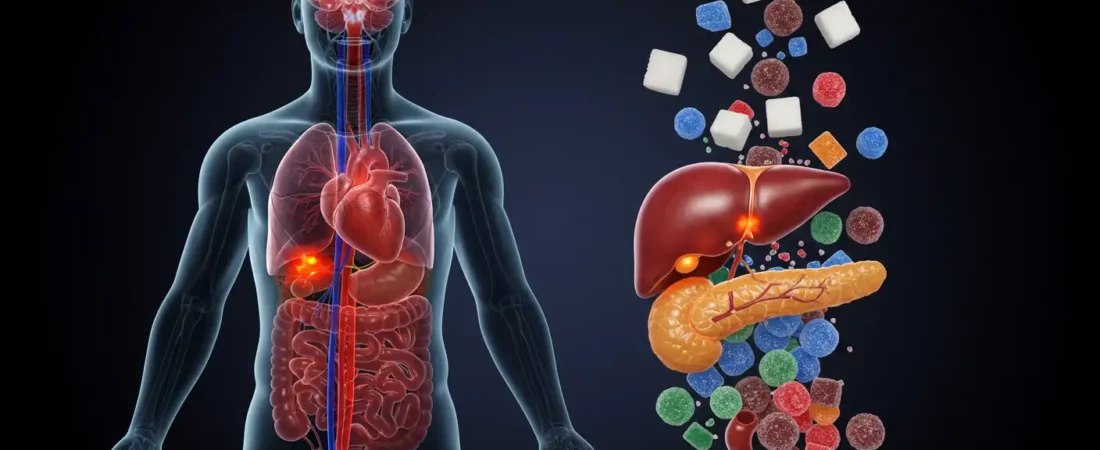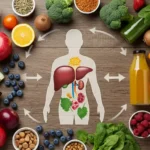Introduction
Sugar. It’s in your coffee, your cereal, your snacks even your so-called “healthy” yogurt. But do you truly understand the shocking effects of sugar on your body? This article reveals the shocking truth about sugar addiction, how it silently fuels disease, disrupts your healthy lifestyle, and how you can regain control through healthy eating and awareness.
The Shocking Truth About Sugar: The Hidden Effects on Your Body
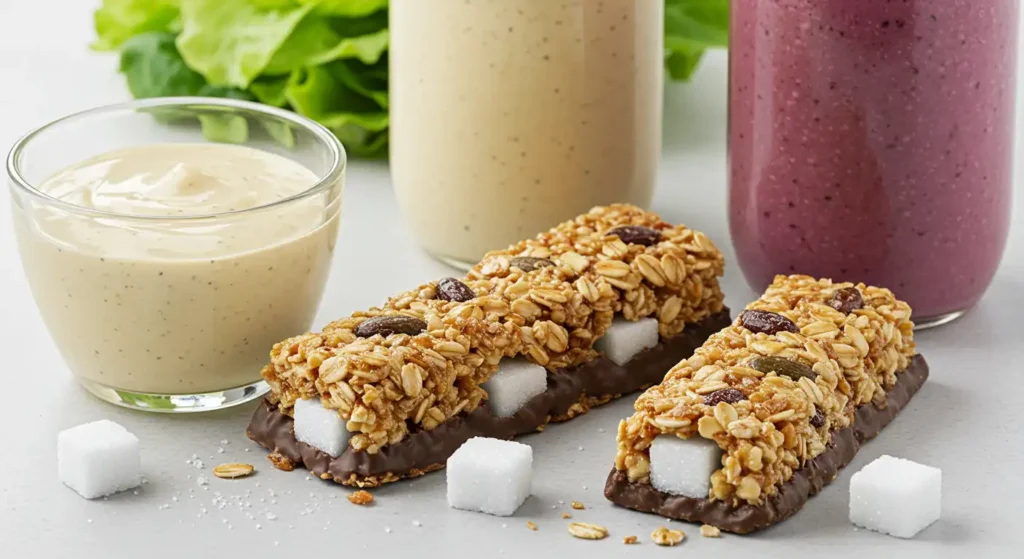
Understanding the shocking truth about sugar is essential for anyone aiming to maintain a healthy lifestyle. While sugar may seem harmless in small amounts, its widespread presence in everyday foods and its long-term impact on your health reveal a much more complex and dangerous picture. From silent weight gain to serious chronic conditions like diabetes, the effects of sugar are both immediate and deeply rooted.
How Sugar Sneaks into Your Everyday Meals
Many people believe they’re making smart choices by opting for products labeled as “low-fat” or “healthy.” However, these items often contain hidden sugars to improve taste and texture. You’ll find added sugar lurking in unexpected places such as:
- Salad dressings
- Whole grain cereals
- Granola bars
- Yogurt
- Ketchup
- Flavored oatmeal
- Even whole wheat bread
Because these foods are marketed as part of a healthy eating plan, consumers unknowingly exceed their daily sugar intake, sometimes by double or triple the recommended amount.
According to the American Heart Association, men should consume no more than 36 grams of added sugar per day, while women should limit themselves to 25 grams. Yet, many processed foods contain up to 20 grams of sugar in just one serving creating a pathway to sugar addiction and long-term health issues.
The Immediate and Long-Term Effects of Sugar on Brain and Body
The Shocking Effects of Sugar on the Brain
The moment sugar enters your bloodstream, it triggers a release of dopamine, a neurotransmitter that controls the brain’s reward system. This is the same mechanism activated by addictive drugs like nicotine and cocaine. The result? Repeated sugar consumption rewires the brain, reinforcing compulsive behavior and leading to full-blown sugar addiction.
As highlighted in a 2013 study published in Neuroscience & Biobehavioral Reviews, sugar may cause neurochemical changes similar to those associated with substance dependence (source). In short, sugar is not just a bad habit it can become a physiological addiction.
From Energy Spikes to Chronic Fatigue and Diabetes
Initially, consuming sugar delivers a rapid boost of energy, making you feel temporarily alert and focused. However, this is followed by a sharp energy crash, leaving you fatigued, moody, and craving more sugar to restore balance. This pattern contributes to weight gain and emotional instability.
More concerning is the long-term damage. Consistent blood sugar spikes force your pancreas to work overtime, producing excess insulin. Over time, this leads to insulin resistance, a major precursor to type 2 diabetes.
But the truth doesn’t stop there. Sugar also fuels chronic inflammation, a known risk factor for serious illnesses such as:
- Cardiovascular disease
- Certain types of cancer
- Non-alcoholic fatty liver disease
- Cognitive decline and Alzheimer’s
As the effects of sugar accumulate, the body becomes trapped in a cycle of inflammation, fatigue, and hormonal imbalance all of which undermine a truly healthy lifestyle.
Why Even “Natural” Sugar Isn’t Always Healthy
Many people turn to alternatives like honey, agave, or coconut sugar, believing they are making healthy eating choices. While these options may seem more natural, they can still spike your blood glucose and contribute to the same negative outcomes if consumed in excess.
Breaking Free from the Cycle of Sugar Addiction
The shocking truth is that most of us are consuming far more sugar than we realize and it’s affecting everything from our energy levels to our risk of chronic disease. But here’s the good news: once you understand where sugar hides and how it impacts your body, you can take steps to eliminate it and reclaim your health.
Start by:
- Reading ingredient labels carefully
- Choosing whole, unprocessed foods
- Staying hydrated and well-rested
- Using spices like cinnamon or nutmeg to satisfy sweet cravings naturally
- Incorporating more fiber, protein, and healthy fats into your meals
Making these changes not only helps break the chains of sugar addiction, but it also lays the foundation for a vibrant, sustainable, and truly healthy lifestyle.
Sugar Addiction Is Real: The Shocking Truth and Long-Term Effects on Your Healthy Lifestyle
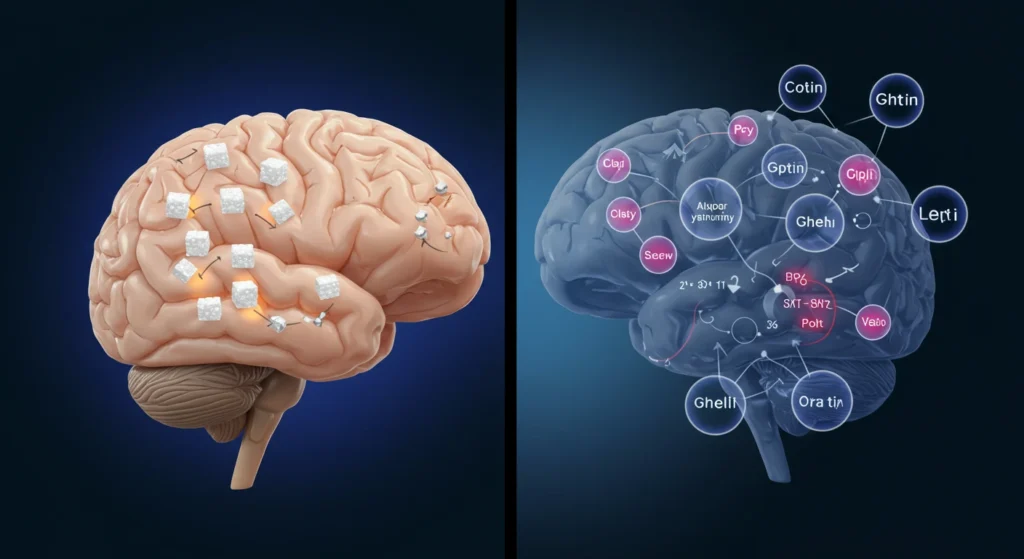
Why You Crave Sugar Even When You’re Not Truly Hungry
Have you ever reached for a cookie or soda, not because you were hungry, but simply because you felt bored, stressed, or anxious? You’re not alone and there’s a shocking truth behind this common behavior.
Sugar activates the brain’s mesolimbic reward system, the same area influenced by powerful substances like opioids and nicotine. When you eat sugar, your brain releases dopamine the “feel-good” chemical which provides a momentary high. However, just like with addictive drugs, this pleasure fades quickly, leading you to crave more to achieve the same satisfaction.
Over time, your brain adapts to frequent sugar spikes by downregulating dopamine receptors. This means you need more sugar to feel good, which creates a dangerous cycle of sugar addiction.
“Repeated exposure to sugar-rich diets produces neural adaptations that are similar to drug abuse, including changes in dopamine transmission and receptor expression.”
— Avena et al., Neuroscience & Biobehavioral Reviews (source)
This explains why sugar cravings can feel almost uncontrollable, especially in moments of emotional vulnerability. The urge isn’t driven by hunger it’s driven by neurological conditioning that undermines a healthy lifestyle.
How Sugar Hijacks Your Hormones and Sabotages Healthy Eating
One of the most overlooked effects of sugar is its ability to disrupt the delicate hormonal balance that controls hunger and satiety. Two key hormones are at play: leptin and ghrelin.
- Leptin signals your brain that you’re full and should stop eating.
- Ghrelin, on the other hand, tells your brain that you’re hungry and should eat.
Excess sugar, particularly from fructose, can cause leptin resistance a condition where your brain no longer recognizes the signals of fullness. At the same time, ghrelin levels may rise, leading you to feel hungrier even after eating.
This hormonal imbalance contributes directly to overeating, especially of high-calorie, low-nutrient foods. The result? You eat more, feel less satisfied, and slowly begin to gain weight often in the form of dangerous visceral fat around your abdomen.
This isn’t just about a few extra pounds. It’s about the onset of metabolic syndrome, a cluster of conditions that include:
- Abdominal obesity
- High blood pressure
- Elevated blood sugar
- Abnormal cholesterol levels
All of these are powerful predictors of type 2 diabetes, heart disease, and even cognitive decline.
Thus, sugar doesn’t just affect your taste buds or waistline. It alters your biology, reshaping your relationship with food and derailing your long-term healthy eating goals.
Breaking the Sugar Addiction Cycle: A Lifestyle Transformation
Fortunately, there is a path forward. The first step in breaking sugar addiction is awareness. Recognizing the shocking truth that sugar affects both your brain chemistry and hormone levels empowers you to make informed decisions.
Transitioning to a healthy lifestyle involves:
- Reducing processed food consumption
- Replacing sugary snacks with whole fruits or nuts
- Eating balanced meals rich in protein, fiber, and healthy fats
- Staying active and managing stress levels
- Getting enough sleep to support hormonal regulation
By consciously reducing sugar intake, you begin to re-sensitize your brain’s reward system and restore hormonal balance. Over time, you’ll find that cravings diminish, energy levels stabilize, and your overall well-being improves significantly.
The Shocking Link Between Sugar and Chronic Disease: The Hidden Effects on Your Healthy Lifestyle
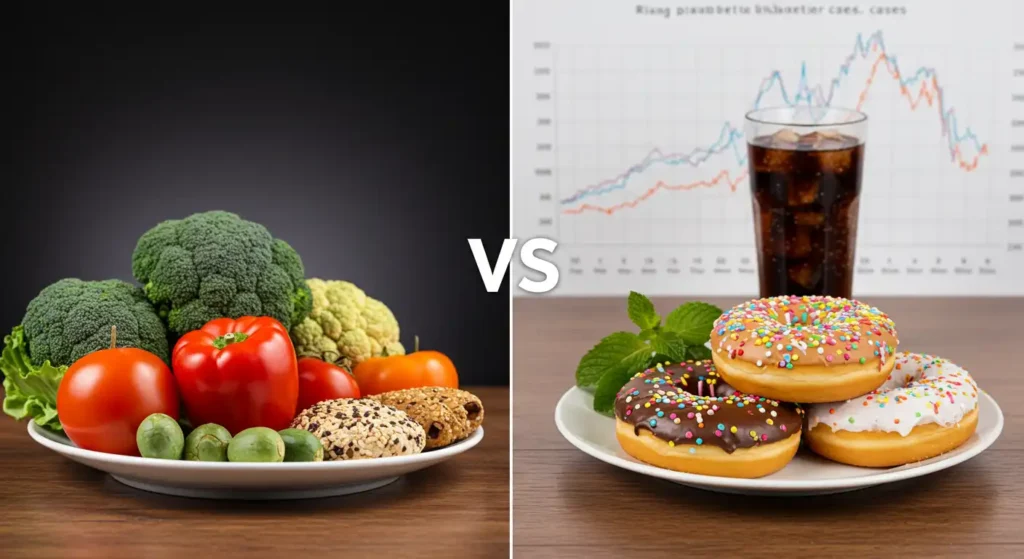
Sugar and Diabetes: The Shocking Truth Behind a Global Epidemic
There’s a shocking truth behind the rise of chronic diseases worldwide and sugar is at the center of it all. Among these diseases, type 2 diabetes has emerged as one of the most alarming epidemics of our time, with devastating effects on public health and individual well-being.
According to the World Health Organization (WHO), the number of adults living with diabetes has increased from 108 million in 1980 to over 422 million in 2014 and the trend has continued climbing since then. One of the primary drivers of this surge is the excessive consumption of refined sugars, especially in processed foods and sugary beverages.
“High consumption of sugary drinks is associated with an increased risk of type 2 diabetes, independently of obesity.”
— World Health Organization (WHO) (source)
But how exactly does sugar contribute to diabetes?
When you consume refined sugars such as those found in soft drinks, pastries, breakfast cereals, and even so-called “healthy” snacks your blood glucose levels spike rapidly. In response, your pancreas produces insulin, the hormone responsible for transporting sugar from the bloodstream into cells. However, when this process occurs too frequently, your cells become resistant to insulin’s effects, leading to insulin resistance.
Insulin resistance is the hallmark of type 2 diabetes and is also closely associated with metabolic syndrome, a dangerous condition that increases your risk of heart disease, stroke, and other chronic health problems.
The Hidden Effects of Sugar on a Healthy Lifestyle and Long-Term Wellness
While sugar is often seen as a source of quick energy or a treat after a long day, its long-term effects on your body tell a very different story. Beyond diabetes, the effects of sugar extend to a variety of chronic illnesses, including:
- Obesity: Excess sugar, particularly fructose, increases fat accumulation around vital organs.
- Heart Disease: Sugar promotes chronic inflammation, which damages artery walls and increases the risk of cardiovascular problems.
- Liver Disease: Fructose is metabolized in the liver and, in excess, leads to non-alcoholic fatty liver disease (NAFLD).
- Cancer: High sugar intake may promote tumor growth by increasing insulin levels and inflammation.
- Cognitive Decline: Studies suggest a strong link between sugar consumption and neurodegenerative diseases such as Alzheimer’s.
Clearly, sugar doesn’t just threaten your waistline it poses a real danger to your overall healthy lifestyle and long-term quality of life. Even more concerning is how sugar often hides in products that appear healthy, misleading well-intentioned consumers.
Healthy Eating as the First Line of Defense Against Diabetes
Fortunately, lifestyle intervention particularly in the form of healthy eating habits is the most effective tool for both preventing and managing type 2 diabetes.
Here’s how you can take control:
- Eliminate Sugary Beverages: Replace sodas and sweetened juices with water, herbal teas, or infused water.
- Read Nutrition Labels: Sugar hides under names like high-fructose corn syrup, maltose, and dextrose.
- Choose Whole Foods: Fresh fruits, vegetables, lean proteins, and whole grains support balanced blood sugar.
- Limit Simple Carbs: White bread, pasta, and processed snacks cause rapid glucose spikes.
- Practice Portion Control: Eating mindfully can help reduce calorie intake and stabilize insulin response.
By making these sustainable changes, you not only protect yourself from diabetes, but also reinforce a healthy lifestyle that supports energy, mental clarity, and emotional stability.
The Shocking Effects of Sugar on Mental Health and Your Healthy Lifestyle
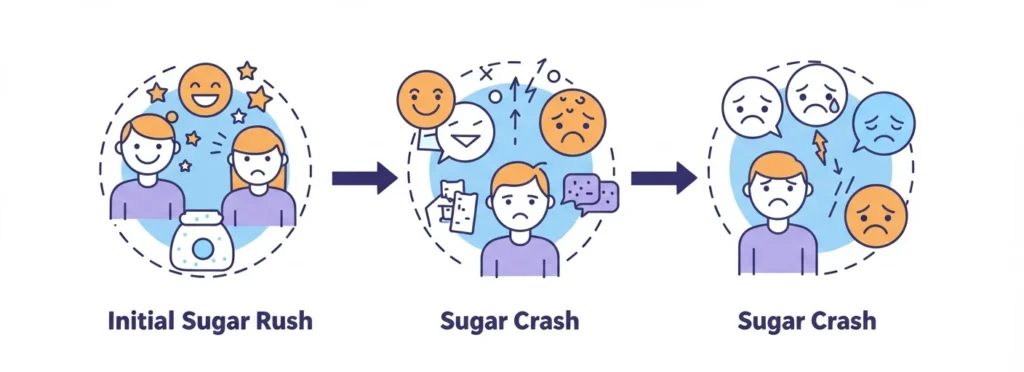
When we think of the effects of sugar, most people focus on weight gain or diabetes. However, the shocking truth is that sugar addiction has profound and often overlooked consequences on your mental health. From intense mood swings to a higher risk of depression and cognitive decline, the effects of sugar on your emotional well-being are both alarming and real.
The Mood-Swing Machine: How Sugar Disrupts Emotional Balance
At first glance, consuming sugar feels great. You might grab a cookie or drink a soda and feel a quick surge of energy and even happiness. This is because sugar rapidly elevates your blood glucose levels, triggering the release of dopamine, the “feel-good” chemical in your brain.
However, what follows is not so sweet.
As blood sugar levels plummet shortly after, you’re left feeling tired, irritable, foggy, and sometimes even anxious. These abrupt highs and lows in mood are not simply random they are the direct result of unstable glucose levels caused by refined sugars.
Over time, repeated exposure to these sugar crashes can lead to more than just bad moods. Research now shows a strong correlation between chronic sugar consumption and an increased risk of mental health disorders such as anxiety and depression.
In that same study, researchers found that men who consumed the highest levels of sugar had a 23% greater risk of developing a mood disorder. While sugar may provide temporary comfort, its long-term impact on mental health is deeply concerning and should not be underestimated.
Can Sugar Worsen ADHD and Accelerate Cognitive Decline?
Another shocking truth about sugar is its potential impact on cognitive health especially among children and older adults.
Emerging evidence suggests that high sugar intake may worsen symptoms of ADHD (Attention Deficit Hyperactivity Disorder). While some studies show conflicting results, many parents and healthcare professionals report noticeable behavior improvements in children who adopt a healthy eating plan low in refined sugars and artificial additives.
Furthermore, excessive sugar consumption has been linked to impaired memory and a higher risk of cognitive decline in adults. High-sugar diets promote inflammation, oxidative stress, and insulin resistance all of which contribute to neurodegenerative conditions such as Alzheimer’s disease.
This reinforces the fact that sugar doesn’t only affect your body it affects your mind. Reducing sugar is not just about cutting calories; it’s about preserving mental clarity, emotional resilience, and long-term brain health.
A Healthy Lifestyle Begins With Brain-First Nutrition
To support both mental and physical well-being, prioritizing healthy eating habits is essential. Here are some brain-boosting, sugar-reducing tips to protect your mental health:
- Replace refined sugar with natural sources like fruits, which contain fiber and antioxidants.
- Choose complex carbs (like oats, quinoa, or sweet potatoes) that release energy slowly and stabilize mood.
- Include healthy fats, such as omega-3s from flaxseed, chia, and fish, which support brain function.
- Stay hydrated, as dehydration can also mimic fatigue and confusion.
By adopting a more mindful and informed approach to food, you can shield your brain from the shocking effects of sugar while embracing a healthier lifestyle that supports lasting emotional wellness.
Healthy Eating Habits: How to Break Free from Sugar Addiction and Reclaim Your Lifestyle

Sugar addiction is more common and more serious than many people realize. The effects of sugar go far beyond weight gain or cavities. They affect your energy, mood, hormones, and even your long-term healthy lifestyle. But the truth is, breaking free from sugar isn’t just about willpower. It’s about creating a sustainable, healthy eating strategy that supports your mind and body.
Below, we explore key methods to overcome sugar dependence and develop healthy eating habits that truly last.
Start with Awareness: The Shocking Truth Hidden in Labels
The first and most essential step in overcoming sugar addiction is awareness. Sugar hides in many so-called healthy foods often under misleading or scientific-sounding names. To avoid falling into this trap, it’s crucial to read ingredient labels carefully and identify the many disguises sugar wears.
Common hidden sugars include:
- High fructose corn syrup
- Dextrose
- Maltodextrin
- Cane juice
- Glucose syrup
- Evaporated cane sugar
- Rice syrup
Many people unknowingly consume excess sugar daily by eating “healthy” packaged products like granola bars, yogurt, and energy drinks all of which can be loaded with sweeteners that sabotage your healthy lifestyle.
Replace, Don’t Deprive: Smart Substitutions for a Healthier Life
One of the most effective ways to break sugar addiction isn’t through strict restriction, but through mindful replacement. Rather than depriving yourself which can lead to frustration and rebound cravings try swapping sugary treats with nutrient-dense, naturally sweet alternatives.
Here are some ideas:
- Fresh fruits like berries, apples, and grapes
- Medjool dates for their rich, caramel-like sweetness
- Cinnamon or vanilla to add flavor without sugar
- Herbal teas with natural sweetness, such as licorice root or cinnamon bark
These alternatives not only satisfy your sweet tooth but also nourish your body. They reduce the risk of energy crashes and help you stay committed to a truly healthy lifestyle.
Support Your Body with Nutrient-Dense, Sugar-Balancing Foods
Fighting sugar addiction isn’t just about what you remove it’s also about what you add. Choosing foods that are rich in fiber, protein, and healthy fats will keep your blood sugar levels stable, reduce cravings, and help retrain your palate.
Top nutrient-dense, sugar-balancing foods include:
- Avocados: Packed with healthy fats and fiber
- Eggs: High in protein to keep you full longer
- Leafy greens: Rich in magnesium, which may help regulate glucose
- Nuts and seeds: Great sources of good fats and plant-based protein
Combining these foods creates a balanced, satiating diet that not only curbs sugar cravings but also supports weight management, mental clarity, and metabolic health.
By incorporating these choices, you naturally move away from sugar-heavy diets and embrace a healthier eating pattern without feeling restricted.
Transitioning Into a Sustainable Healthy Lifestyle
Saying goodbye to sugar doesn’t mean saying goodbye to enjoyment. In fact, many people report feeling more energetic, clear-minded, and emotionally balanced after reducing their sugar intake.
As you make these changes:
- Be patient with your body’s adjustment period.
- Keep healthy snacks on hand to avoid sugar traps.
- Practice mindful eating to reconnect with your natural hunger cues.
Remember, the truth about sugar is that its grip on your body is real but it’s also reversible. With consistency, education, and a few simple changes, you can reclaim control and live a healthy lifestyle free from sugar’s toxic hold.
The Shocking Truth About Natural Sweeteners: Are They Really a Healthy Alternative?

As more people seek to reduce their sugar intake and embrace a healthy lifestyle, natural sweeteners have gained immense popularity. They’re often marketed as a safe and healthy way to satisfy your sweet tooth but what’s the real truth behind them? Are they genuinely better, or do they carry their own shocking effects on your body?
Let’s dive into the effects of sugar alternatives, from plant-based options to artificially “sugar-free” products, and explore how they impact your health, metabolism, and cravings.
Stevia, Monk Fruit, and Erythritol: Healthier Choices or a Hidden Risk?
Natural sweeteners such as stevia, monk fruit extract, and erythritol have become staples in the kitchens of health-conscious individuals. Derived from plants, these sweeteners offer sweetness without calories and typically do not cause blood sugar spikes making them popular among those managing diabetes or battling sugar addiction.
Benefits:
- Stevia is extracted from the Stevia rebaudiana plant and is up to 200 times sweeter than sugar, yet has zero calories.
- Monk fruit (luo han guo) contains compounds called mogrosides, which provide sweetness without affecting glucose levels.
- Erythritol is a sugar alcohol that is naturally found in some fruits and is well tolerated in small amounts.
However, the truth is that even natural sweeteners aren’t a free pass. Excessive consumption especially of sugar alcohols like erythritol may lead to bloating, gas, or other forms of gut discomfort. Moreover, relying heavily on these substitutes may perpetuate your sweet cravings, making it harder to fully reset your taste buds and adopt a truly healthy eating pattern.
“While non-nutritive sweeteners may be helpful for reducing calorie intake, they are not a magic bullet. Moderation and a balanced diet remain essential.”
— Harvard T.H. Chan School of Public Health (source)
The Problem with “Sugar-Free” Labels and Artificial Sweeteners
Walk through any grocery store, and you’ll see rows of products boldly labeled as “sugar-free.” These seem like smart choices for anyone trying to cut sugar but that can be misleading. Many of these items are filled with artificial sweeteners like aspartame, sucralose, acesulfame K, or saccharin, which pose their own risks.
Key Concerns:
- Though calorie-free, artificial sweeteners can still activate sugar receptors in the brain, maintaining the cycle of sugar addiction.
- Some studies suggest these sweeteners may alter gut microbiota, potentially contributing to insulin resistance or inflammation.
- Despite lacking calories, they may trick the body into expecting energy, leading to increased hunger and compensatory eating later.
In other words, sugar-free doesn’t always mean healthy and can sometimes make it even harder to maintain a sustainable healthy lifestyle.
Striking the Right Balance for Healthy Eating
Ultimately, when evaluating the shocking truth about natural sweeteners, the key lies in balance and intention. If you’re transitioning away from sugar, these sweeteners can be useful tools. However, they should not become a long-term crutch.
Here are a few healthy lifestyle tips:
- Focus on whole foods and limit processed sugar-free products.
- Use natural sweeteners sparingly and opt for fruit-based sweetness when possible.
- Re-train your palate by gradually reducing all forms of sweetness in your diet.
By staying mindful, you can avoid the shocking side effects of artificial and overused sweeteners and embrace a truly nourishing, sustainable approach to healthy eating.
Conclusion: Take Control of the Truth About Sugar
The shocking truth is this: Sugar isn’t just empty calories it’s a powerful substance that affects your brain, your body, your mood, and your long-term health. From sugar addiction to diabetes, from fatigue to inflammation, sugar is doing more harm than you might realize.
But here’s the empowering part: With knowledge, intention, and a commitment to a healthy lifestyle, you can regain control. Start by making small swaps. Read labels. Fuel your body with real, whole foods.
